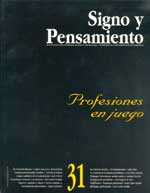Resumen
El texto ubica la formación universitaria de los comunicadores sociales en el contexto de las estrategias de desarrollo en América Latina, de los nuevos retos y los nuevos cambios en la producción y acceso al conocimiento y explica el nuevo modelo de Facultad propuesto por la Universidad de Lima, Perú. Plantea elgunas reflexiones sobre la tarea que debe asumir la universidad devitar las presiones del mercado y la competencia educativa, pero respondiendo a las necesidades de nuestra sociedades y el imperativo de compatibilizar el sentido del éxito profesional con la excelencia y el cultivo de valores democraticos y ciudadanos.Esta revista científica se encuentra registrada bajo la licencia Creative Commons Reconocimiento 4.0 Internacional. Por lo tanto, esta obra se puede reproducir, distribuir y comunicar públicamente en formato digital, siempre que se reconozca el nombre de los autores y a la Pontificia Universidad Javeriana. Se permite citar, adaptar, transformar, autoarchivar, republicar y crear a partir del material, para cualquier finalidad (incluso comercial), siempre que se reconozca adecuadamente la autoría, se proporcione un enlace a la obra original y se indique si se han realizado cambios. La Pontificia Universidad Javeriana no retiene los derechos sobre las obras publicadas y los contenidos son responsabilidad exclusiva de los autores, quienes conservan sus derechos morales, intelectuales, de privacidad y publicidad.
El aval sobre la intervención de la obra (revisión, corrección de estilo, traducción, diagramación) y su posterior divulgación se otorga mediante una licencia de uso y no a través de una cesión de derechos, lo que representa que la revista y la Pontificia Universidad Javeriana se eximen de cualquier responsabilidad que se pueda derivar de una mala práctica ética por parte de los autores. En consecuencia de la protección brindada por la licencia de uso, la revista no se encuentra en la obligación de publicar retractaciones o modificar la información ya publicada, a no ser que la errata surja del proceso de gestión editorial. La publicación de contenidos en esta revista no representa regalías para los contribuyentes.


